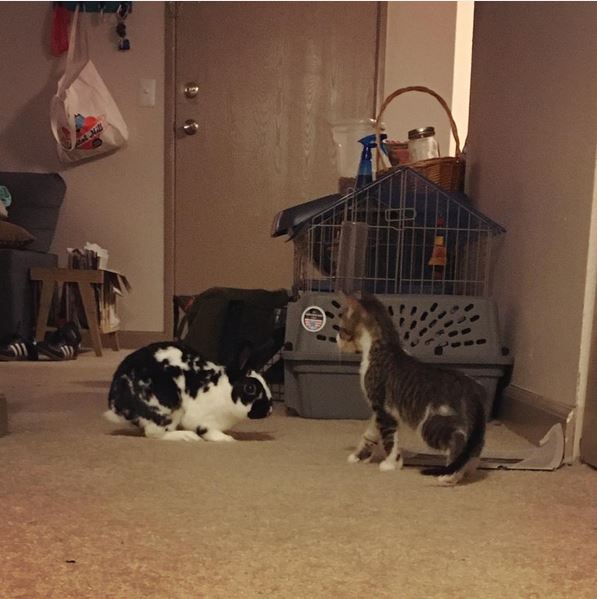I am active in the local rabbit rescue and humane society. This answer is based on multiple conversations with many cross species pet parents. All the points made are from experiences shared by parents and supported by reliable references where available.
In my opinion and experience a rabbit & cat are probably the two easiest animals to join together in a single household. In any introduction of a new family member to the household early visits should be supervised, and the new member should not be left alone with existing member(s) until everyone is comfortable. Introducing two rabbits to each other is called bonding, it can be a significant undertaking.
The most appropriate cat is going to be a well socialized (not feral) adult cat, in short a cat that acts friendly to you can reasonably be expected to act friendly to the rabbit in your family. A kitten can be brought in but is more difficult, with the kitten being somewhat at risk. The size difference between the cat and rabbit are of minor concern. With the most important issue being to prevent the prey/predator responses particularly during the first visit. Rabbits are territorial and may be overly aggressive toward the cat during early visits so, do not let stereotypes cloud your judgement during introductions.
So what makes a rabbit and cat so well suited for each other?
- They eat different food
- They use different litter boxes
- They are about the same size
- They both like to have friends
- They have complementary body language
The first 4 make perfect sense, but what is this complementary body language thing?
Other than who gets the peoples' attention, cats and rabbits only have one thing to argue about: Dominance.
When two rabbits come together the one on the bottom is dominant; they are presenting themselves to be groomed. Failure to provide grooming on demand can be painful, this is part of why the rabbit will often be the most dominant pet in the house.
So when the cat and the rabbit approach each other, the rabbit will have its head lowered to assert its dominance (I AM ROYALTY YOU MUST GROOM ME). The cat will immediately notice that the bunny is approaching in the classic cat language, submissive head down posture, and the cat knows that the bunny has recognized the cat's natural dominance and is bowing before it. The image below captures abby hairboat's (OP) Kitten meeting her rabbit.

In this one most important element, the battle for dominance, both the cat and the rabbit win.
So what should you look for, in finding a feline companion for the bunny?
The perfect candidate will likely be at your local shelter. They will probably be in a room with multiple cats (sometimes called a cat colony, where the most sociable cats live in a group). They will be an adult of any age. You and the cat will like each other.
The largest concern, is litter box sharing. A cats litter and litter box are not appropriate for a rabbit. Addressing that is the subject of the question If I have both a cat and a rabbit, can they (or should they) share a litter box?
